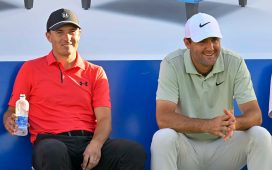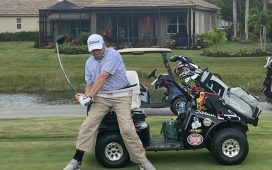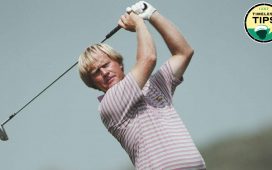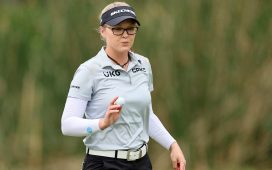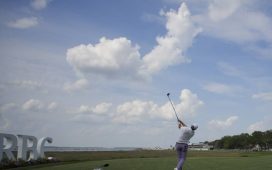LA QUINTA, Calif. – One thing that many sports fans forget on a regular basis is that the athletes they cheer for, or cheer against as the case may be, are human beings. They aren’t just soulless gladiators entering into the stadium, and they aren’t all living the glamorous life that fans sometimes believe sports stars lead.
Athletes have spouses and children and parents and move into new homes and new states. They deal with injuries and issues at work just like every day human beings.
And sometimes that means dealing with the darker issues that life can hand out, including alcoholism.
As Chris Kirk teed off Thursday in The American Express golf tournament in La Quinta, he did so having overcome the demands of a major medical exemption from the tour in order to secure a full exemption for the rest of this season. But it wasn’t a torn ligament or a broken bone that kept Kirk off the tour for six months in 2019. It was his own acceptance of his abuse of alcohol and that he had to change his life.
“Oh, there’s a lot of things that I can’t believe I did, and most of them I don’t really want to talk about to be honest with you,” Kirk said. “But I would say the big thing is just how delusional my mind became for a while there and how I let my kind of anxiety run rampant, which was fueled by the lifestyle that I was living and just completely irrational thoughts that I got to that felt very, very real and reasonable to me.”
The American Express: Leaderboard | Tee times, TV | Photos
So Kirk, a four-time winner on the PGA Tour, left the tour in May of 2019. And the PGA Tour, to its credit, gave Kirk the time to deal with his issue and a path to come back to the tour after his absence.
When Kirk returned to the tour at the end of the 2019 calendar year, he did so on an exemption that gave him a specified number of tournaments to earn enough FedEx Cup playoff points to regain the full exempt status he had when he left the tour.
It’s an approach that every sports organization should follow. Treating alcoholism and depression and other issues just like a surgically repaired shoulder. Treating the athlete like a human being who needs help and support rather than treating the alcoholism as just the athlete throwing his talent and career away.
Rally back from the brink
More than a year and a half after leaving the tour because he was trying to figure out how much he could drink the night before a round and still be a competitive player, Kirk is a different person with a different outlook these days. Not about golf, but about life.
“That’s one of the best gifts of sobriety and recovery is that I can kind of, I’m able to see things for what they are now, which is great and gives me a great sense of peace that no matter what comes my way, as long as I stay sober and stay in my program and do things the right way, then I can deal with whatever,” Kirk said.
As for the major medical exemption, it was coming to an end last week at the Sony Open. Kirk needed no worse than a two-way tie for third at the Hawaiian event to regain that full exemption. Kirk shot 65 each of the four days of the event and tied for second, just enough to be exempt for the rest of the 2020-21 season.
“It certainly felt like a win to me. It just totally kind of changed my year to say the least,” Kirk said. “To go from, I mean I was about to sign up for some Monday qualifiers and definitely had already looked at the Korn Ferry schedule when I would be playing out there and going from that to now being where I’ll most likely get into Bay Hill and going to be able to play the Players and just a completely kind of back to the schedule that I’ve enjoyed the last 10 years is pretty nice. I certainly won’t be taking it for granted, that’s for sure.”
Meaning just as much as the good finish for Kirk was the support from his fellow players when he finished the Sony Open.
“It’s kind of become a great support group and these are people that care a lot about me personally probably moreso than professionally,” Kirk said. “So to kind of see that on Sunday, when you know it’s there. I mean obviously Brendon (Todd) and I have been really close for a long, long time and have kind of seen the ups and downs of both of our careers, but just to see how genuine that caring was from them is something that’s really special.”
In this day and age when we see athletes in other major sports seemingly acting against their own best interests for no reason, sabotaging their careers or just disappearing from their teams or their sports, the story of Chris Kirk and the PGA Tour and his return to competitiveness only after his return to sobriety is a blueprint that other athletes and other sports ought to follow.
